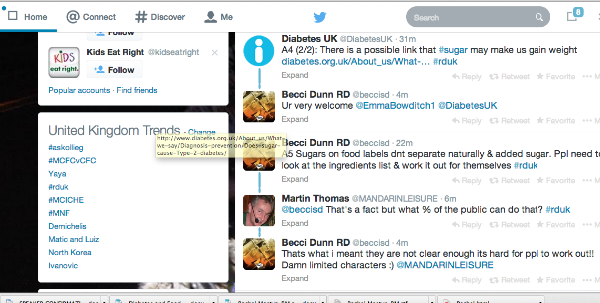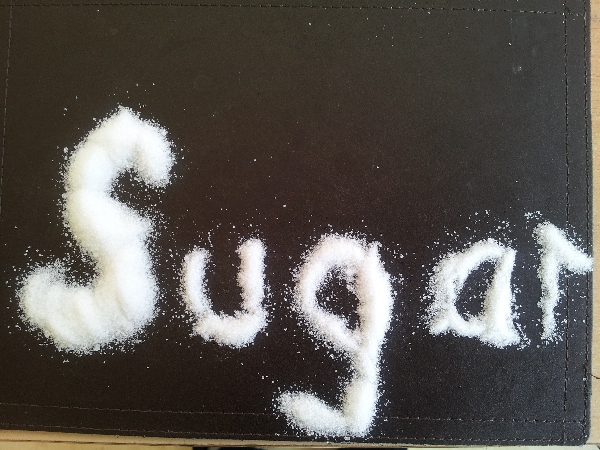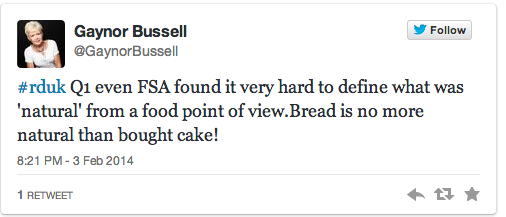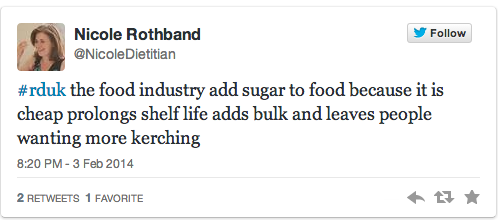From the start of 2014, the media frenzy over sugar has heightened… January started off with British Dietetic Association spokespeople contributing to major newspapers, and it’s still a hot topic with no sign of cooling down. Since the start of the year, I’ve been leading , giving a presentation to media medics and providing quotes to and magazines to see if I can get some sort of expert consensus. Here’s a summary of my three months debating whether sugar really is the new tobacco.
12 January 2014 – you may remember the headline in The Sunday Times: “Obesity tsar calls for tax on juice”. Soon after that, I was asked for my opinion in The Guardian’s equally sensational headline ”. My opinion then (and now) is that fruit juice is perfectly acceptable in the appropriate portion size of 150ml a day and that ideally you should drink it with a meal to reduce the impact on teeth.
3 February 2014 – Professional Twitter Chat
I led an RDUK professional twitter chat entitled The Sugar Debate. You won’t be surprised to learn that #RDUK was trending for almost an hour in the UK and we reached over 1.6 million people through retweets.
Here’s a flavour of that twitter chat:


Some popular expert opinions from the #RDUK twitter chat:
- It’s all about balance!
- Sugar is not the only demon. You can’t blame one nutrient for obesity or obesity-related disorders. The only substantive evidence is on the link between sugar and tooth decay.
- Fruit sugars are not necessarily virtuous. But natural sugars are in a more nutrient-rich matrix.
- Sugar has no nutrients, and it can make you gain weight.
- Sugar does not cause diabetes but not all sugars have the same glycaemic effect.
- Don’t under-estimate the sugars in fruit juice, so watch portion size.
- Sugar is sometimes needed for weight gain, recovery from illness and for athletes.
- There needs to be better education on sugar “guises” (such as honey, treacle, syrup, molasses), which appear on labels.
- It’s good advice to cut down on all processed foods, savoury foods too.
8 February 2014 – The RDUK chat was referenced in the Grocer, under the headline “Are cracks forming within the “nutty” anti-sugar brigade”? The article highlighted the views around balance and also the Diabetes UK tweet: “Foods that are high in sugar may be high in calories but total nutrient content is more important”.
24 February 2014 – Media Medics Views
I was asked to present to a group of media medics at the Food and Drink Federation Briefing on Sugar. I opened up the sugar debate and here’s a summary of the opinion from the experts working in the media:
- There needs to be better education to help the public decipher labels and understand what a healthy portion size looks like.
- Juice should continue to be part of the five-a-day recommendation but portion size is an issue.
- More people are juicing at home and are unaware of high sugar consumption as a result.
- There’s a lack of awareness around the effect of sugar on dental health and that sugar-rich drinks should be consumed with meals.
- We need to balance the recent negative media coverage and use the evidence to demystify the messages.
25 March 2014 – I was asked for my views on sugar by Tesco Healthy Living. My three top tips:
- I feel that when sugar is part of a milk-based or fruit-based food, it is present in a healthier matrix; there’s calcium and protein in a milkshake, and you get fibre and other nutrients from a fruit smoothie.
- The word “natural” sometimes makes us believe a food is healthier, but it’s important to note that although, for example, there are a few minerals in brown sugar (like potassium and iron), you’re not going to make a significant difference to your mineral intake by switching to brown sugar instead of white.
- Sugar is hidden in foods you may not expect to have sugar, such as canned vegetables, bread or soups. Front of pack food labelling can help you compare brands.
Read full article here.
In conclusion…
Dietitians and degree-qualified nutritionists base their advice on published evidence, and I am keen that we debate the issues so that we can all learn from each other. If sugar in cereal helps kids to have breakfast and get a source of calcium from milk as well as fortified micronutrients from the cereal, I’m not against some sugar-containing breakfast cereals as part of a varied week. If sugar in yogurt helps people choose yogurt instead of a rich dessert, they’re likely to get more protein, calcium and iodine. If a glass of fruit juice or smoothie has natural sugar from fruit, I’d rather drink that than a sugar-rich soft drink with no other nutrients.
I will continue to seek consensus but for now I’d argue that small amounts of sugar as part of an overall healthy eating plan, taken ideally with a meal, is fine – in fact, eating a little of what you fancy is going to make healthy eating a lot more palatable.






